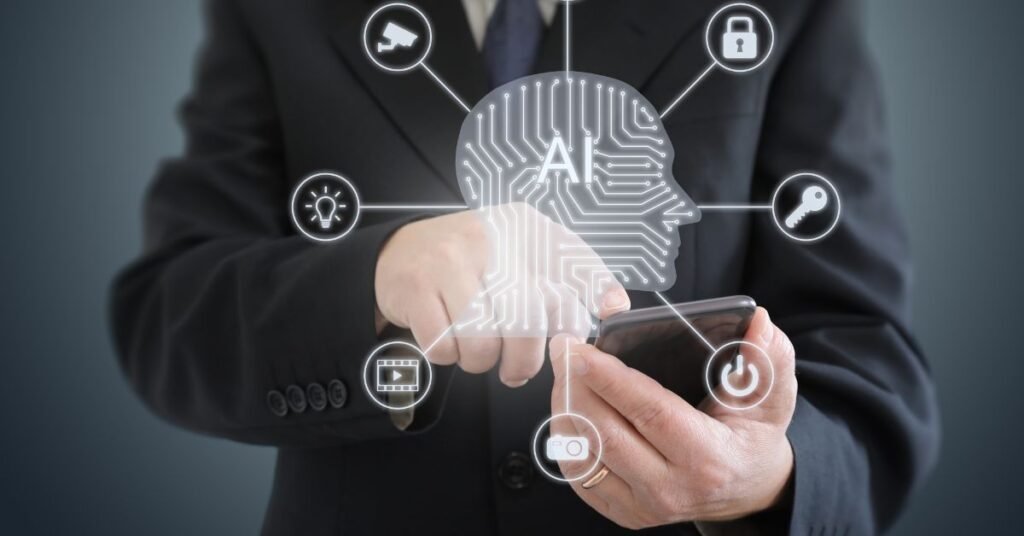Artificial intelligence is no longer a concept reserved for tech labs. In 2025, it is actively transforming workplaces across the US.
From automation in manufacturing to AI-powered tools in education and healthcare, every sector is experiencing change.
This guide explores the AI Future Work Transformation, focusing on how jobs are being reshaped, what skills are in demand, and how professionals and students can prepare for long-term success.
Imagine stepping into an office where your AI assistant schedules meetings, drafts reports, and suggests strategies based on real-time data.
Or a hospital where AI helps diagnose patients faster than traditional methods. This is not science fiction. It is the daily reality of 2025, where AI is changing how we work, the skills we need, and the roles that will exist in the coming decade. The question isn’t whether AI will transform work, but how prepared we are for the shift.

1. Understanding the AI Future Work Transformation
The term AI Future Work Transformation describes the ongoing shift in work environments due to artificial intelligence.
Unlike earlier technological revolutions, this one is not just about machines replacing physical labor. AI is now handling cognitive tasks such as data analysis, customer support, financial forecasting, and even creative writing.
In 2025, AI isn’t only about efficiency. It’s about collaboration. Workers and AI systems often function as partners.
For example, marketing teams rely on AI to analyze consumer behavior, but humans still craft the emotional narratives that connect with people.
This hybrid model is expected to continue growing, with AI supporting rather than completely replacing most professional roles.
2. Industries Most Impacted by AI
AI’s influence isn’t spread evenly. Some industries are seeing faster adoption than others:
Healthcare
- AI systems assist in early disease detection, imaging analysis, and personalized treatment plans.
- Nurses and doctors now use AI as a diagnostic partner rather than a replacement.
- Administrative tasks like insurance claims and patient scheduling are increasingly automated.
Education
- Personalized learning platforms adapt lesson plans to student performance.
- Teachers use AI to identify struggling students earlier.
- Virtual classrooms powered by AI extend access to education globally.
Finance
- AI handles fraud detection, credit scoring, and investment insights.
- Financial advisors increasingly use AI-driven analytics to advise clients.
Manufacturing
- Robotics combined with AI boosts productivity and safety.
- Predictive maintenance reduces downtime by anticipating equipment failures.
Retail
- Personalized recommendations, inventory management, and chatbot assistants improve customer experience.
- AI-powered logistics optimize supply chains.
3. Jobs Being Reshaped
The AI Future Work Transformation does not mean mass unemployment, but it does mean change. Some jobs will disappear, many will evolve, and entirely new ones will emerge.
- Roles at risk: Routine clerical jobs, data entry, basic bookkeeping, and certain customer service positions are vulnerable.
- Roles evolving: Healthcare professionals, teachers, and marketers are seeing their jobs enhanced with AI tools.
- New opportunities: AI ethics officers, prompt engineers, automation managers, and AI trainers are becoming sought-after careers.
This shift mirrors past industrial revolutions, but the speed of adoption in AI makes retraining more urgent than ever.
4. The Skills Needed in 2025 and Beyond
If jobs are changing, skills must evolve too. The following abilities are becoming crucial:
- Digital literacy: Comfort with AI-powered platforms and software.
- Critical thinking: The ability to evaluate AI outputs and make informed decisions.
- Adaptability: Willingness to learn and retrain as industries evolve.
- Emotional intelligence: Skills that AI cannot replicate, like empathy and interpersonal communication.
- Technical expertise: For those interested in tech roles, skills in machine learning, data science, and cybersecurity are in high demand.
For US workers, balancing soft skills with technical skills is the key to thriving in the new economy.
5. Benefits of AI in the Workplace
While discussions about AI often highlight risks, the benefits are significant:
- Efficiency: AI reduces repetitive work, allowing humans to focus on higher-level tasks.
- Accessibility: Remote work tools powered by AI create more opportunities for global collaboration.
- Innovation: AI helps businesses test ideas faster, leading to more creativity in problem-solving.
- Work-life balance: Automation can reduce long hours spent on routine tasks.
When implemented responsibly, AI has the potential to create more meaningful work experiences.
6. Risks and Ethical Considerations
The AI Future Work Transformation also raises important concerns.
- Job displacement: While new roles are emerging, not all workers have equal access to retraining.
- Bias in AI systems: If not properly managed, AI can reinforce existing inequalities.
- Privacy concerns: With AI analyzing more personal data, protecting information becomes a critical issue.
- Overreliance on automation: Companies must balance efficiency with human oversight to avoid errors.
These risks highlight the need for governments, businesses, and educational institutions to create frameworks for ethical AI adoption.
7. How the US Is Preparing for the Shift
In the US, responses to AI-driven change include:
- Government initiatives: Federal and state programs are funding workforce retraining in areas like data analysis and cybersecurity.
- Corporate investment: Tech giants like Google, Microsoft, and IBM are investing heavily in AI tools while also creating certification programs for employees.
- Education sector: Universities and online platforms now offer affordable courses on AI and related fields.
This preparation is essential because AI’s integration into work is accelerating at a pace faster than previous industrial shifts.
8. Comparing AI’s Impact Across Job Levels
One important aspect of the AI Future Work Transformation is how it affects different job levels:
- Entry-level jobs: More likely to be automated, which raises concerns for young workers.
- Mid-level roles: Employees see their responsibilities shift toward managing AI-driven tasks.
- Senior roles: Leadership positions increasingly focus on strategy, ethics, and managing AI integration.
This layered impact means everyone, regardless of career stage, must prepare for change.

9. Real-Life Examples of AI Integration
- A US hospital chain uses AI-powered imaging to detect cancers earlier, reducing diagnostic time by 30%.
- A retail company leverages AI to forecast product demand, minimizing waste and boosting profits.
- An education startup uses AI tutors to help students master difficult subjects faster.
These examples show that AI is not abstract but already woven into everyday work.
10. Preparing for the Future: A Roadmap
For individuals and organizations, preparation is key. Here’s how to approach it:
- For professionals: Invest in continuous learning through online courses, certifications, and hands-on experience with AI tools.
- For students: Focus on fields that combine technology with human skills, such as healthcare technology, AI ethics, or digital marketing.
- For businesses: Develop retraining programs and focus on human-AI collaboration rather than replacement.
- For policymakers: Ensure fair access to retraining opportunities and regulate AI to prevent misuse.
Conclusion
The AI Future Work Transformation is not a distant possibility. It is the reality of 2025. AI is already reshaping jobs, creating new skill requirements, and pushing industries to rethink their operations. For US workers, this moment represents both challenge and opportunity.
For students, the recommendation is clear: pursue an education that combines technical literacy with human-centered skills.
For professionals, the best approach is adaptability embrace AI tools, but also invest in skills that AI cannot replicate. Those who prepare thoughtfully will not only survive but thrive in this new era of work.
Also Read: Artificial Intelligence Stocks 2025: Top Picks for Investors
The broader implication is clear: the future of work will be AI-native, and platforms like @Soly_AI are leading that transformation.
— BENEDICT @playsomo | $SOMO (@Taiye1260) August 22, 2025

Abdul Basit is a US-based tech writer who covers Apple innovations, Tesla’s EV growth, AI breakthroughs, smartphone trends, and app reviews for global readers.
